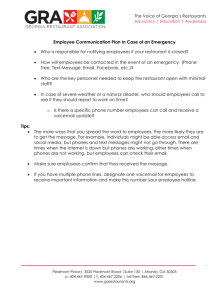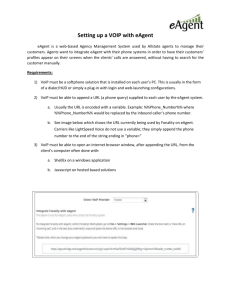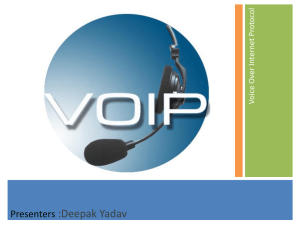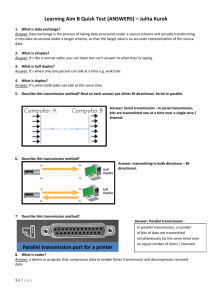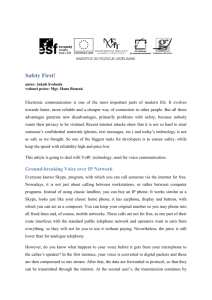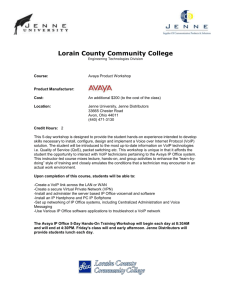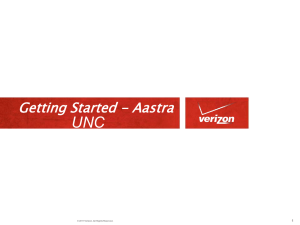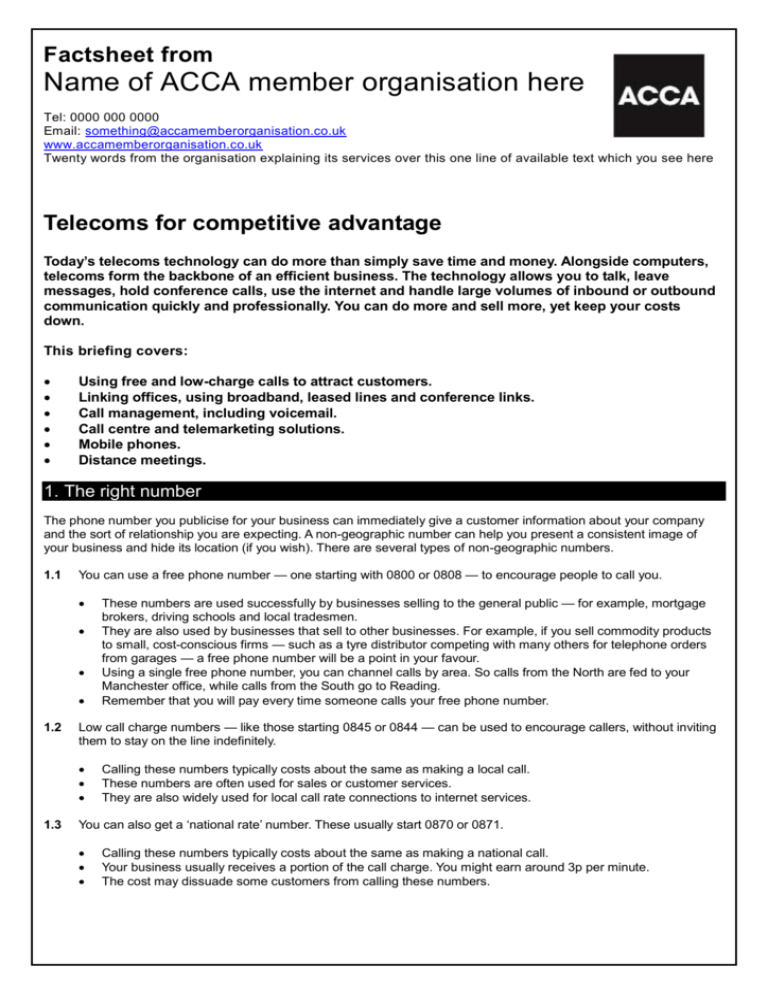
Factsheet from
Name of ACCA member organisation here
Tel: 0000 000 0000
Email: something@accamemberorganisation.co.uk
www.accamemberorganisation.co.uk
Twenty words from the organisation explaining its services over this one line of available text which you see here
Telecoms for competitive advantage
Today’s telecoms technology can do more than simply save time and money. Alongside computers,
telecoms form the backbone of an efficient business. The technology allows you to talk, leave
messages, hold conference calls, use the internet and handle large volumes of inbound or outbound
communication quickly and professionally. You can do more and sell more, yet keep your costs
down.
This briefing covers:
Using free and low-charge calls to attract customers.
Linking offices, using broadband, leased lines and conference links.
Call management, including voicemail.
Call centre and telemarketing solutions.
Mobile phones.
Distance meetings.
1. The right number
The phone number you publicise for your business can immediately give a customer information about your company
and the sort of relationship you are expecting. A non-geographic number can help you present a consistent image of
your business and hide its location (if you wish). There are several types of non-geographic numbers.
1.1
You can use a free phone number — one starting with 0800 or 0808 — to encourage people to call you.
1.2
Low call charge numbers — like those starting 0845 or 0844 — can be used to encourage callers, without inviting
them to stay on the line indefinitely.
1.3
These numbers are used successfully by businesses selling to the general public — for example, mortgage
brokers, driving schools and local tradesmen.
They are also used by businesses that sell to other businesses. For example, if you sell commodity products
to small, cost-conscious firms — such as a tyre distributor competing with many others for telephone orders
from garages — a free phone number will be a point in your favour.
Using a single free phone number, you can channel calls by area. So calls from the North are fed to your
Manchester office, while calls from the South go to Reading.
Remember that you will pay every time someone calls your free phone number.
Calling these numbers typically costs about the same as making a local call.
These numbers are often used for sales or customer services.
They are also widely used for local call rate connections to internet services.
You can also get a ‘national rate’ number. These usually start 0870 or 0871.
Calling these numbers typically costs about the same as making a national call.
Your business usually receives a portion of the call charge. You might earn around 3p per minute.
The cost may dissuade some customers from calling these numbers.
1.4
There are certain special numbers that can be exploited for marketing purposes.
1.5
Premium-rate numbers — such as those starting 090 — are generally used to fund a service such as technical
support.
1.6
‘Golden numbers’ that are easy to remember can sometimes be bought from the phone companies, for fees of
up to £1,000 each. There is also a ‘grey market’ in secondhand golden numbers.
Alphadial numbers, where the letters on the phone keys spell out a name, are not widely recognised. They are
best avoided.
They can cost as much as £1.50 a minute to call. Your business will receive a significant proportion of the call
charges.
You can use international 0800 to give people a free and simple way of responding to your overseas advertising.
The fixed costs are low, at about £100 per quarter. You only pay call charges if you are successfully
generating sales leads.
Many UK hotels and holiday companies use this approach to win business.
2. Getting online
Internet access is essential for businesses. High-speed connections are widely available and affordable.
2.1
ADSL is the cheapest way to connect your business to the internet.
2.2
Leased lines are permanently open, dedicated digital connections, used only by your business.
2.3
It uses your existing telephone line to connect to the internet.
The connection is always on. Voice calls can be made simultaneously.
Charges are fixed, usually on a monthly basis, although you can make a saving by paying up-front annually.
Service is available across most of the UK, but the speed of your connection may be restricted by your
proximity to the local telephone exchange.
A range of data transfer speeds, with different prices, are available.
A single ADSL connection can easily be shared between several users.
ADSL is generally a very cost-effective way to connect to the internet, and more than adequate for most small
businesses.
A leased line provides the best connection if you need a permanent link between two offices, or if your
business has a large number of internet users.
Leased lines are usually backed by comprehensive support and a guaranteed response time if the connection
fails.
Leased lines are much more expensive than ADSL connections and require specialist installation.
They are useful in situations where internet access is absolutely critical.
Once connected to the internet, IP telephony means that your IT network can be used to handle voice as well as
data.
You do not need to have IT resources in-house to unlock the benefits. It is cheap to set up and the benefits
can be immediately seen, including lower maintenance and call costs.
Professional telephony features include phone conferencing and auto call back.
IP telephony can also be implemented in small chunks — for example, to lower external call costs — or on a
larger scale — for example, to get free calls between offices. These building blocks can mix and match with
existing phone systems.
3. Call management
3.1
Interactive voice response (IVR) systems enable customers to pick the service or department they want, by
following instructions. For example, ‘For sales, press one’.
2
3.2
Some IVR systems also respond to spoken numbers or key words.
3.3
For example, a local garage might ask customers to say whether they want ‘new cars’, ‘service’ or ‘parts’.
You can buy inexpensive software to provide IVR for a small firm.
Implemented well, voicemail offers advanced call answering and handling features.
3.4
There can be savings, as each call is ideally only handled once, by the right person.
The system needs to be carefully planned, as most people dislike multi-level menus.
Many people object to having to deal with a machine at all.
Always provide a direct route for callers who do not fit into the categories.
Voicemail allows callers to leave a spoken message for the person they are calling.
Some systems allow messages to be forwarded for a colleague to deal with.
For example, a sales manager could record a briefing once, enter a code and copy it automatically to the
whole sales team.
Some services can convert voicemail to text and send it to the recipient as an email or text message.
Small businesses may benefit from a virtual reception.
An agency provides call-answering services, puts callers through to the right extension or takes messages.
4. Call centres
Call centres can be the focus of both outbound activities (such as telesales, lead generation and market research) and
inbound ones (such as order processing and customer service).
4.1
In-house call centres are replacing many field sales forces.
4.2
Computer Telephone Integration (CTI) boosts productivity for both inbound and outbound work.
4.3
A call centre can be anything from two people drumming up orders for a small wholesaler to a large team in a
debt recovery or telesales business.
It is the degree of automated support for the operation that makes it a call centre.
Completely automated call centres can sometimes provide adequate service with no human intervention — for
example, booking cinema tickets, where callers just need to press numbers.
For example, your customer service system can match a caller’s number to data in a contact management
database and make the details you need pop up on screen.
The system must be able to integrate with your customer records, whether held in a spreadsheet or your
database.
Inexpensive software can give outbound operators one-touch dialling plus on-screen scripts and prompts.
Outsourcing to a specialist company may be the most cost-effective strategy.
If you need 24-hour staffing or your business is highly seasonal, outsourcing is likely to be cheaper.
If you need expertise you do not have, outsourcing may be more economical than employing more people.
Some internet service providers and software companies outsource the handling of technical queries to
specialist call centres.
5. Mobility
5.1
Voicemail is the first line of defence against missing calls while you are on the move.
When choosing a system, consider sound quality, whether you can operate the system remotely, and any time
limits on incoming messages.
3
5.2
Mobile phones are the obvious way to stay in touch on the move.
5.3
Voicemail can be either a function of your phone system or a network service provided by your telephone
company.
Mobile phones will usually increase your total spending on telecoms. But the payoff is less wasted time.
A wide range of calling plans include unlimited calls between people within your business, reduced
international rates, cheaper off-peak calls or free text messages. Evaluate your needs carefully before signing
a contract.
Set out clear rules about personal use of company mobiles. Call barring can be used to limit non-business
calls — or even to bar all outgoing calls.
Ask your supplier about equipment that lets you call company mobiles from your office phone at the cheaper
mobile-to-mobile (same network) rate.
You can also get online to access email and the office network.
Most mobile phones include basic email functions. These allow you to read and write emails on the move.
Smartphones ― such as the BlackBerry or iPhone — allow you to browse the web, check emails and run a
huge range of business-related applications. The rapid growth of mobile ‘apps’ means you should consider if it
is worth launching your own.
Many mobiles have large screens. Equipped with these, your employees can use the internet and read
documents when away from the office.
Mobile phone networks also offer mobile broadband services. These allow you to connect a laptop computer
to the internet using a small adapter (a ‘dongle’).
6. Meetings at a distance
The telephone conference and its high-tech brother, the videoconference, are beginning to be used by many small
businesses.
Audio conferences can often be justified on direct cost grounds, for weekly project reports or monthly sales meetings.
Videoconferencing is mostly used for special, non-routine projects.
6.1
Telephone conferences can save money and effort, because a one-hour meeting takes just one hour of each
person’s time.
6.2
The simplest form of telephone conference is a three-person phone call.
Some telephone systems and mobile phones allow you to initiate three-way calling at no extra cost.
Speaker phones for conference use allow several people to have a discussion with one person or several at
another location.
There are a number of low-cost conference call services which allow you to make conference calls on a ‘pay
as you go’ basis. Typically you pay just the cost of the call. Examples include Powwownow and BT MeetMe.
Participants can be brought in and dropped out of the meeting. People can also take part using mobile
phones.
Videoconferencing is beginning to be economical enough for small firms to use.
Professional videoconferencing equipment requires a very fast internet connection and can be expensive.
A cheaper alternative is to use a webcam with free instant messaging. Software which supports video chat
includes Skype and Microsoft Windows Live Messenger.
VoIP
Voice over Internet protocol (VoIP) is a way of making telephone calls using the internet. The sound of your voice is
converted into digital information and is then sent across the internet.
A.
You can make calls using software on a computer, or through a special VoIP telephone.
4
B.
You can call other VoIP users and people using normal telephone lines.
Making calls using VoIP can be much cheaper than using a conventional telephone.
The biggest savings come with international calls. VoIP companies can charge much less because the calls
are routed efficiently over the internet.
Many telephone systems will offer the option of placing calls using VoIP.
You may wish to place domestic calls using your normal telephone lines, but make international calls using
VoIP.
Your telephone system may be able to choose the cheapest option for each call automatically.
With the right equipment, using VoIP is no different to using a normal telephone, yet it can offer significant
savings.
Ask your telephone supplier for information about VoIP systems.
Expert contributors
Thanks to James Passingham (Foehn, 0208 940 7919).
Further Help
Last reviewed 01.02.11
© BHP Information Solutions 2011. ISSN 1369-1996. All rights reserved. No part of this publication may be reproduced or transmitted without the
written permission of the publisher. This publication is for general guidance only. The publisher, expert contributors and distributor disclaim all liability
for any errors or omissions. Consult your local business support organisation or your professional adviser for help and advice.
5


